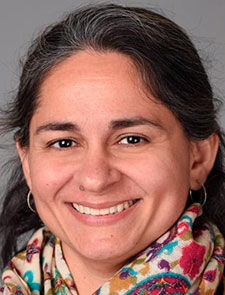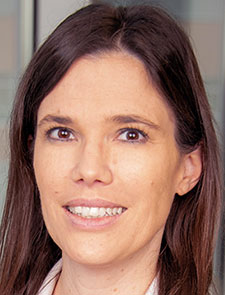 Diversity, equity, and inclusion. DEI.
Diversity, equity, and inclusion. DEI.
Sometimes the buzzword that DEI has become can evoke a sense of being overwhelmed. So many things can seem to fall short of important goals that even trying seems futile.

Dr. Kara
Wrong, says Areeba Kara, MD, MS, FACP, SFHM, co-chair of SHM’s DEI Special Interest Group.
“You absolutely have to break it down into smaller problems,” said Dr. Kara, an associate professor of clinical medicine and associate division chief of the division of general internal medicine at the Indiana University School of Medicine in Indianapolis. “It’s the sum of the whole. Fix every process we can…Every little thing we do, if we stop and think for one moment, ‘How can I make this more inclusive? ‘How can I make this fairer?’ I think we can get there.”
SHM’s Special Interest Groups are intended to “create communities of hospitalists around topics of interest practice areas and/or care models.” In today’s practice environment, perhaps no group touches on personal, professional, and patient-centeredness like the DEI community. That might explain its 1,618 members—yes, it’s one of the largest SIGs.

Dr. Burden
SIG co-chair Marisha Burden, MD, FACP, SFHM, says the value of focusing on DEI is self-evident.
“It is bringing opportunity to everyone so that we all thrive, and we make better decisions when we bring more diverse backgrounds and perspectives,” said the professor of medicine and division head of hospital medicine at the University of Colorado School of Medicine in Aurora.
“Thinking about diversity, equity, inclusion, and justice in every single facet of what we do is really critical to ensuring a successful workforce and, frankly, successful patient care and organizational outcomes. It is the foundational component of everything we do. So, taking that lens, whether it’s how we offer something at a national meeting, how we ensure we mitigate bias in our patient care, or how we ensure equal opportunity for all. It’s just very important principles for everything we do.”
Drs. Burden and Kara encourage everyone to find their own “why” and identify what they can do in their own spheres of influence. It could be spending five extra minutes with a patient, using interpreters, and being mindful of not using stigmatizing language in the documentation. It could also be advocating at institutional and national levels.
“As leaders of the Society’s DEI SIG, we have witnessed first-hand the difference the dedication and enthusiasm the DEI SIG members have brought to this work—truly leading change,” the pair wrote in an email to The Hospitalist.
Take a paper published in 2020 in the Journal of Hospital Medicine, “SPEAKers at the National Society of Hospital Medicine Meeting: A Follow-UP Study of Gender Equity for Conference Speakers from 2015 to 2019. The SPEAK UP Study.”
The report found that by having an open call for speakers—versus leadership choosing speakers outright—the representation of women increased, as did satisfaction scores for sessions. The results were so noticeable, the study’s conclusion questions whether “an open-call process with peer review for speakers may be a systematic process that national meetings could replicate to reduce gender inequities.”
“What if you implement something as simple as, an open-call process, what does it do for diversity?” Dr. Burden said. “When you implement this very strategic process, a very simple open-call process, it removes the gender inequities that previously existed. We studied this and published our findings and that was one example of sharing knowledge with others so they can learn and perhaps implement it in their day-to-day practice. What are some simple things we can do every day to make our work better, more equitable?”
Dr. Kara, born and raised in Karachi, Pakistan, knows the value of diversity, as she and her husband hail from Asia, and her children were born in the United States.
“I would hope we can evolve into a space where I don’t have to be a minoritized person in this country to understand what the experience (of other minoritized individuals) is like,” she said. “I would like to think we’re all compassionate and empathetic enough to be able to understand why we need to spend that extra time to build that trust.”
Coming from that perspective, Dr. Kara says it’s incumbent on hospitalists to put themselves in the shoes of their patients.
“You have to remember that the person in the hospital bed is going through some really horrible things, and they’re not always going to be their best self,” she said. “So, all I can do is be my best self at that moment. That is what I’ve tried to model for myself.”
Both Drs. Kara and Burden agree that DEI can seem so broad as to be implacable, but with a combination of improved results, greater opportunity for all, and a healthy dose of humanity, the wins are worth the effort, they say.
“We know that diverse teams are more successful in almost any way you choose to measure success. We know that to eliminate health care disparities we need to become more diverse and intentionally inclusive. There’s data, there are the moral principles, and for me, there’s also a little bit of a selfish push, because my family does not look like families from here, and I want to make this better for them. There’s always that.”
Richard Quinn is a freelance writer in New Jersey.
My understanding of the purpose of DEI (among other purposes), is to promote ‘anti-racism,’ which is a goal that we can all stand behind, of course. However, after reading the mission statement of every DEI group that I have encountered (and SHM’s is no exception), I am left perplexed by what I see as a contradiction. It seems that the very foundation of DEI, and the prerequisite for its existence, IS racism. For me, racism is the identification and labelling of a person based on their race, and then, because of that label, treating them differently (either better or worse) than individuals who do not bear that same label. It seems that this is the process used in DEI to promote diversity and equity. How else is it possible to manipulate the representation of various groups of people without first identifying someone based on their race, and then clearing a path by giving them opportunities and advantages that are not equally offered to everybody? Is that not racism? If the goal, first and foremost, is to be anti-racist, it seems that would mean being anti-DEI (or at least anti-DE). I would like to be ‘included’ in the overall well-meaning DEI movement, but this issue is a sticking point for me. What am I missing?